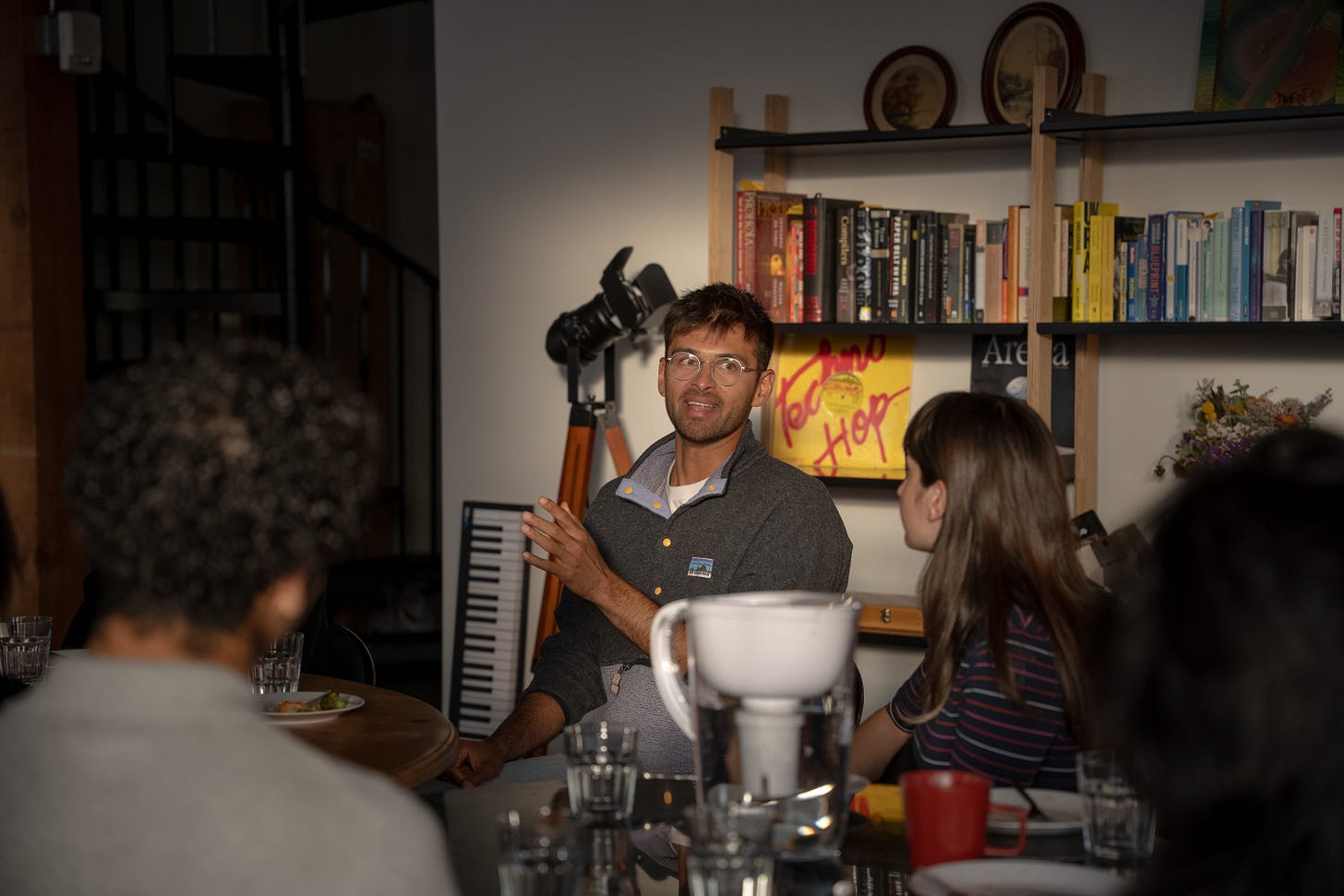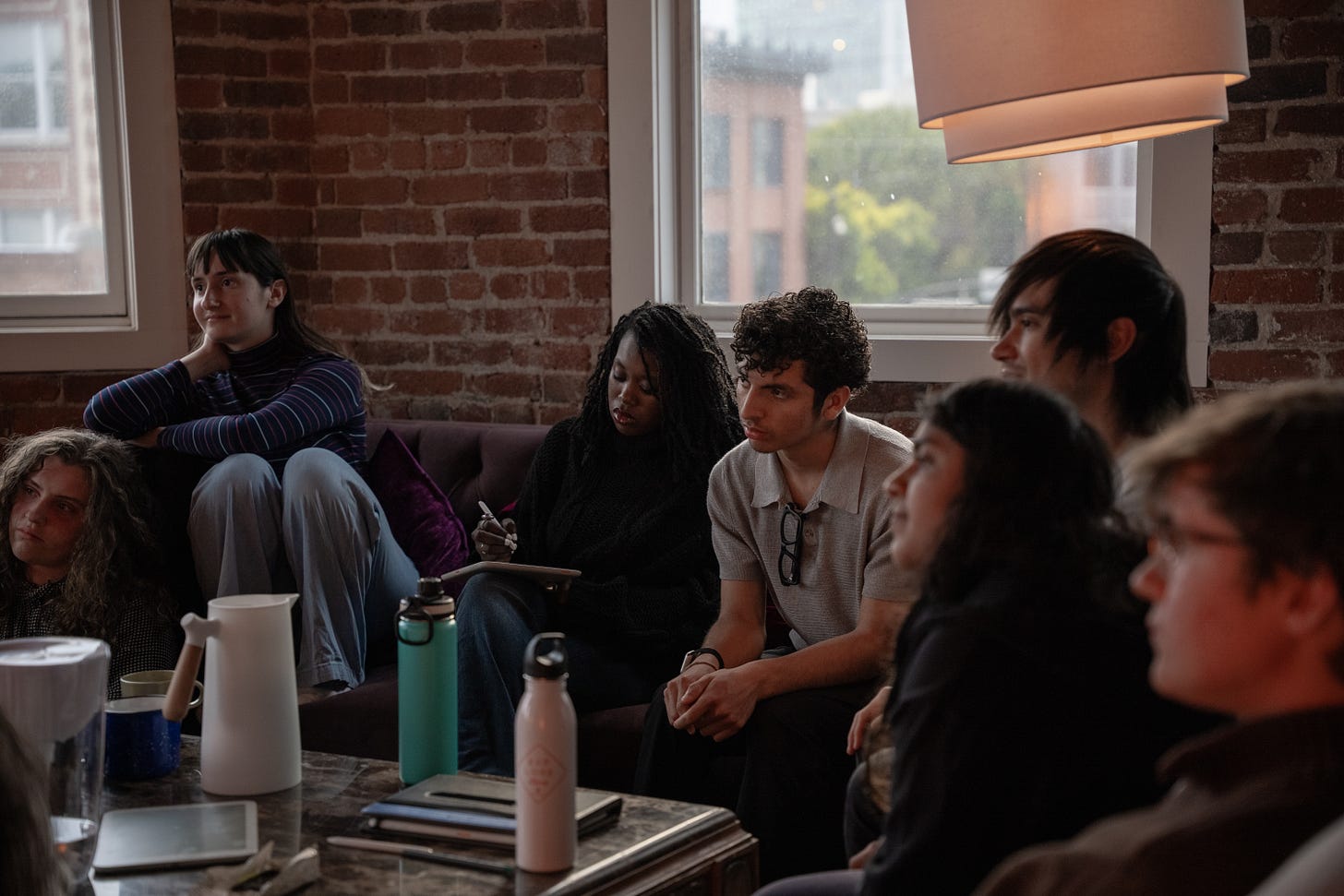Create a masterpiece everyday
A dinner with Farza at Casa Nautilus
San Francisco,
July 20, 2025
Dear polymath,
This is the second installment of a new series where we share insights from guests at Casa Nautilus. Nautilus is a 3-month residency for young polymaths. Proteges’ stay in SF is fully funded with accommodation, food and equipment included, so they can dive into their craft and build ambitious projects.
Did you create a masterpiece today?
Spending the evening with Farza, I was immediately intrigued by his pragmatic approach to building masterpieces. There's a fierce energy about him, rooted in action, and an interesting philosophy for navigating the often-messy journey of creation and communion.
For those who don't know him, Farza is a guy who loves creating things for others. Whether it's selling Dragon Ball Z games on eBay at 13, building experimental apps for gamers, or even launching ZipSchool, which taught 150,000 kids online, his journey is a masterclass on building. Most recently, he founded buildspace— previously the world’s largest school for creators. He’s now in the early days of working on a new product with his friend Sharif.
I left the night with three core principles that underpin his success in building masterpieces:
I. Embracing the cycle of W’s and L’s
“Movement is better than no movement.” That was Farza’s first and loudest principle. Most people obsess over results—viral tweets, big launches, and metrics that feel good. But not Farza, he focuses only on the inputs. He wants to know: Did I ship something today? Did I move? Did I learn?
He calls this the cycle of W’s and L’s. Not wins and losses in the usual sense of material outcomes, but a cycle of effort and feedback. This is the process of compounding that informs which direction to grow in.
“I'd rather take 100 Ls than sit around waiting for a perfect W.”
Each attempt builds the reflexes that let larger masterpieces emerge naturally, over time.
For legends like Michael Jordan, it’s easy to know if he's won the game or not (he can see whether or not the ball goes in the hoop). But for builders, there are so many metrics that make it hard to identify what event or action truly mattered in the grand scheme of it all. The way Farza optimizes for this is by setting the goal to create a masterpiece each day – something that makes him feel like the day was well spent.
One masterpiece each day. That’s the rule. Even if it’s small. Even if no one sees it.
II. Consume to be inspired
What I found particularly intriguing was his approach to consumption. I noticed his website features a content list. So I asked him why he chose to share content over books, and he shamelessly admitted that he doesn't actually enjoy books that much, but he absolutely loves consuming other forms of media. YouTube. TikTok. Music. Movies. Then he uses what inspires him in his work.
He shared an example that his vlogging style was actually inspired by watching PewDiePie. When hiring videographers was once frowned upon in tech, despite many side-eyes, he prioritized hiring one anyway (the great Joshua Bonzo!). Not only is this now standard, but it's cool to do and it was all due to Farza following what was true to him based on what inspired him in the past. Lately, he’s been into boiler room sets so you better believe the energy for the next product launch will be hype!
The lesson here isn’t about what you consume; the call to action isn’t to go watch PewDiePie to try and simulate Farza's success. It’s to consume things with intention and relation.
Ask yourself: What moves me? Why? How can I remix this? Or add it to my work?
Good artists steal, and talented polymaths make the strange seem obvious in hindsight. This is what polymaths do best. They cross-pollinate.
III. Build your council, and your EQ
One thing Farza kept coming back to is the importance of people. Not only being kind. Not only being present. But having a higher level of trusted peers who can keep you in check. He first told us about his co-founder, Sharif, and how their bond is built on aligned philosophies. And how he’s built his own “council,” people he turns to for truth when his mind gets too noisy.
“You need people who tell you when you’re full of shit—and still love you after.”
That’s the magic that bonds us at Nautilus: our peers make up our council. We go on walks together when we’re stuck and ask each other “Am I crazy?” – and listen. And we learn to grow more confident in our intuition as much as course-correcting when we’re proven wrong. These friendships are priceless; being picked up by someone when you’re lost about what to do or who you are is a blessing.
Farza reminded us that building is most fulfilling as a team sport. It’s a living, breathing daily practice. If you show up everyday, track your inputs, turn your consumption into inspiration, and build your council—you’ll not only build amazing products. You’ll build great masterpieces.
Come build your masterpiece with us: apply to the next Nautilus cohort.
Yours very truly,
MacKenzie Fisher, Philosofounder and a Nautilus protege.
Sign up to my publication here.





ty for writing, was sick. will send to a few ppl
banger